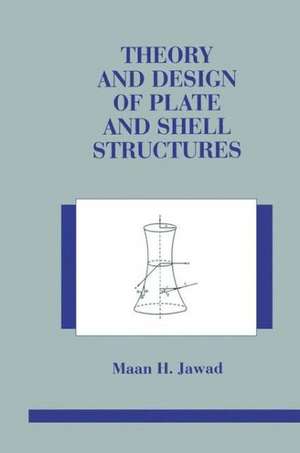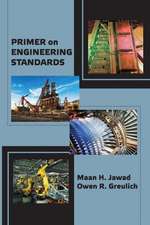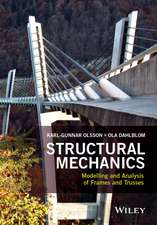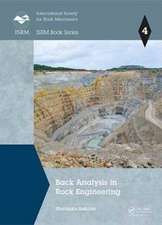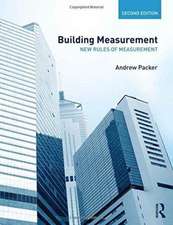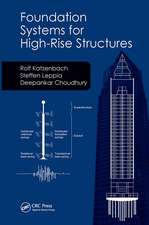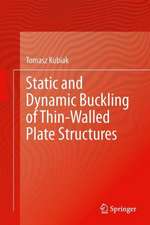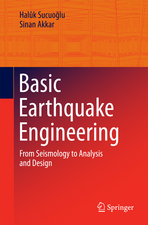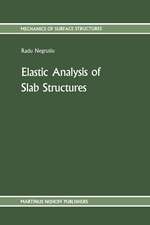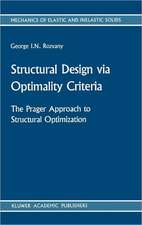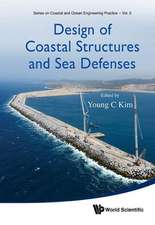Theory and Design of Plate and Shell Structures
Autor Maan Jawaden Limba Engleză Hardback – 30 aug 1994
| Toate formatele și edițiile | Preț | Express |
|---|---|---|
| Paperback (1) | 951.47 lei 6-8 săpt. | |
| Springer Us – 26 sep 2012 | 951.47 lei 6-8 săpt. | |
| Hardback (1) | 956.18 lei 6-8 săpt. | |
| Springer Us – 30 aug 1994 | 956.18 lei 6-8 săpt. |
Preț: 956.18 lei
Preț vechi: 1166.08 lei
-18% Nou
Puncte Express: 1434
Preț estimativ în valută:
182.99€ • 190.34$ • 151.07£
182.99€ • 190.34$ • 151.07£
Carte tipărită la comandă
Livrare economică 14-28 aprilie
Preluare comenzi: 021 569.72.76
Specificații
ISBN-13: 9780412981814
ISBN-10: 0412981815
Pagini: 423
Ilustrații: XV, 423 p.
Dimensiuni: 155 x 235 x 27 mm
Greutate: 0.75 kg
Ediția:1994
Editura: Springer Us
Colecția Springer
Locul publicării:New York, NY, United States
ISBN-10: 0412981815
Pagini: 423
Ilustrații: XV, 423 p.
Dimensiuni: 155 x 235 x 27 mm
Greutate: 0.75 kg
Ediția:1994
Editura: Springer Us
Colecția Springer
Locul publicării:New York, NY, United States
Public țintă
ResearchDescriere
The design of many structures such as pressure vessels, aircrafts, bridge decks, dome roofs, and missiles is based on the theories of plates and shells. The degree of simplification needed to adopt the theories to the design of various structures depends on the type of structure and the re quired accuracy of the results. Hence, a water storage tank can be satis factorily designed using the membrane shell theory, which disregards all bending moments, whereas the design of a missile casing requires a more precise analysis in order to minimize weight and materials. Similarly, the design of a nozzle-to-cylinder junction in a nuclear reactor may require a sophisticated finite element analysis to prevent fatigue failure while the same junction in an air accumulator in a gas station is designed by simple equations that satisfy equilibrium conditions. Accordingly, this book is written for engineers interested in the theories of plates and shells and their proper application to various structures. The examples given throughout the book subsequent to derivation of various theories are intended to show the engineer the level of analysis required to achieve a safe design with a given degree of accuracy. The book covers three general areas. These are: bending of plates; membrane and bending theories of shells; and buckling of plates and shells. Bending of plates is discussed in five chapters. Chapters 1 and 2 cover rectangular plates with various boundary and loading conditions.
Cuprins
Preface. Acknowledgements. Abbreviations for organizations. Bending of simply supported rectangular plates. Bending of various rectangular plates. Bending of circular plates. Approximate analysis of plates. Plates of various shapes and properties. Membrane theory of shells of revolution. Various applications of the membrane theory. Bending of thin cylindrical shells due to axisymmetric loads. Bending of shells of revolution due to axisymmetric loads. Buckling of plates. Buckling of cylindrical shells. Buckling of shells of revolution. Roof structures. Basic Finite element equations. Appendices. Answers to selected problems. References. Index.
Recenzii
Well-written..very strong on applications and design. Certainly should be on the list of references for any course in plates and shells. - Applied Mechanics Reviews, October 1995; Well-written..very strong on applications and design. Certainly should be on the list of refernces for any course in plates and shells. - Applied Mechanics Reviews, October 1995; Well-written..very strong on applications and design. Certainly should be on the list of refernces for any course in plates and shells. - Applied Mechanics Reviews, October 1995; Well-written..very strong on applications and design. Certainly should be on the list of refernces for any course in plates and shells. - Applied Mechanics Reviews, October 1995
